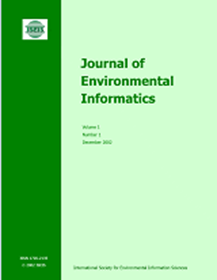通过生态存储模型与进化优化相结合实现水库的环保运行
IF 5.4
1区 环境科学与生态学
Q1 ENVIRONMENTAL SCIENCES
引用次数: 0
摘要
本研究通过将生态模型和水库优化模型联系起来,提出了一种生态水库运行方式。研究建立了一个基于遥感的生态模型,其中模拟了水库表层的水温和溶解固体总量。此外,还通过模糊推理系统生成了生态适宜性图,其中水温和溶解性总固体是输入,归一化适宜性是输出。建立了与生态模型一致的生态水库运行模型,以尽量减少水库的生态适宜性损失和供水损失。此外,还开发了一种非生态运行模式,以尽量减少供水损失。应用可靠性和脆弱性指数以及水库平均生境适宜性来衡量优化模型的性能。结果表明,由于采用了水库生态运行模式,供水可靠性降低了 6%。此外,采用生态运行模式后,供水的脆弱性增加了 14%以上。相反,水库的平均栖息地适宜性通过生态运行提高了 0.35 以上,这意味着生态运行在减轻生态影响方面效果显著。根据案例研究结果,有必要采用水库生态运行来减轻水库对水库及下游生态可持续性的生态影响。建议的方法能够平衡栖息地要求和人类需求本文章由计算机程序翻译,如有差异,请以英文原文为准。
An Environmental Operation of Reservoirs through Linking Ecological Storage Model and Evolutionary Optimization
This study proposes an ecological reservoir operation by linking ecological model and optimization model of reservoir. A remote sensing based ecological model was developed in which water temperature and total dissolved solids were simulated in the surface layer of reservoir. Moreover, ecological suitability maps were generated by a fuzzy inference system in which water temperature and total dissolved solids were inputs and normalized suitability was output. An ecological reservoir operation model was developed consistent with the ecological model to minimize ecological suitability loss of the reservoir as well as water supply loss. Moreover, a non-ecological operation was developed to minimize water supply loss only. Reliability and vulnerability indices and average habitat suitability in the reservoir were applied to measure the performance of the optimization model. Results indicated that reliability of water supply is reduced 6% due to using ecological operation model of the reservoir. Furthermore, vulnerability of water supply is increased more than 14% using the ecological operation. In contrast, the average habitat suitability of the reservoir is increased more than 0.35 by ecological operation which means it is remarkably effective on mitigating ecological impacts. Based on case study results, applying ecological operation of the reservoir is necessary to mitigate the ecological impacts of the reservoir on the ecological sustainability of reservoirs as well as downstream. The proposed method is able to balance the habitat requirements and humans’ needs
求助全文
通过发布文献求助,成功后即可免费获取论文全文。
去求助
来源期刊

Journal of Environmental Informatics
ENVIRONMENTAL SCIENCES-
CiteScore
12.40
自引率
2.90%
发文量
7
审稿时长
24 months
期刊介绍:
Journal of Environmental Informatics (JEI) is an international, peer-reviewed, and interdisciplinary publication designed to foster research innovation and discovery on basic science and information technology for addressing various environmental problems. The journal aims to motivate and enhance the integration of science and technology to help develop sustainable solutions that are consensus-oriented, risk-informed, scientifically-based and cost-effective. JEI serves researchers, educators and practitioners who are interested in theoretical and/or applied aspects of environmental science, regardless of disciplinary boundaries. The topics addressed by the journal include:
- Planning of energy, environmental and ecological management systems
- Simulation, optimization and Environmental decision support
- Environmental geomatics - GIS, RS and other spatial information technologies
- Informatics for environmental chemistry and biochemistry
- Environmental applications of functional materials
- Environmental phenomena at atomic, molecular and macromolecular scales
- Modeling of chemical, biological and environmental processes
- Modeling of biotechnological systems for enhanced pollution mitigation
- Computer graphics and visualization for environmental decision support
- Artificial intelligence and expert systems for environmental applications
- Environmental statistics and risk analysis
- Climate modeling, downscaling, impact assessment, and adaptation planning
- Other areas of environmental systems science and information technology.
 求助内容:
求助内容: 应助结果提醒方式:
应助结果提醒方式:


